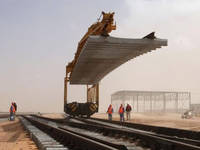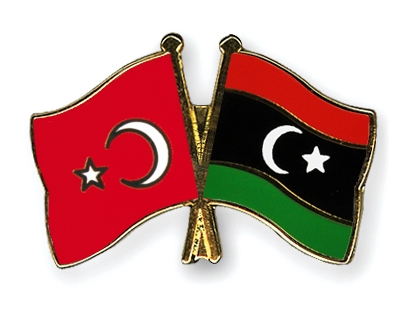By Nigel Ash.

Tripoli, 5 February 2013:
Russian railway chiefs held several hours of talks in Tripoli this morning, aimed at resuming the . . .[restrict]stalled $4.5 billion project to link Benghazi and Sirte with a 554 km railway line.
Russian officials were afterwards tight-lipped about what was the first face-to-face meeting with the Libyans, since the project was abandoned at the start of the revolution. Of the talks held at Tripoli Maritime Port between Transport Minister Abdel-Qader Mohamed Ahmed and Alexander Sultanov, vice-president of Russian Railways (RZhD), an embassy official was prepared to tell the Libya Herald only that “ There were discussions on mutual cooperation but no agreement has been signed.”
The minister however was reportedly more upbeat. He praised the work that had been done by experts and specialists in both countries and described the project as “vital”. Sultanov responded that RZhD was keen to resume the project and, said the Libyan News Agency LANA, was optimistic that agreement on this could be reached,
RZhD began work on the Sirte-Benghazi line in August 2008. The company brought in track laying machinery, flat wagons and a 100 tonne crane. It also built accommodation for 400 workers at what would become Ras Lanuf station. During construction 3,500 Libyan and Russian workers were to be employed.
This project was part of a 3,170 km $12 billion national rail network, the lion’s share of which was awarded to the China Railway Construction Corporation (CRCC). In 2008 it won a $2.5 billion contract to build a 352 km line between Al Khums and Sirte. This was due to be completed by this year. There was also an 800 km line from the iron ore deposits at Wadi Shati near Sebha to Misrata. That line should have been finished last year. In 2009 CRCC was awarded a further contract worth $802 million for 172 km of the network from Tripoli to the Tunisian border at Ras Ejder, to be completed by the middle of this year.
According to the well-informed Railway Gazette International, the whole 95-station network was to need the construction of 240 km of access roads, 554 bridges, 1,205 culverts, and 115 million m3 of earthworks.
After the revolution, the El-Kib government displayed little enthusiasm about picking up the railway projects. The-then Transport Ministry under-secretary Fawzi Bitamr said that there were other priorities, such as civil aviation.
While, post-revolution, the Russians were widely unpopular for their support of Bashar Assad’s regime in Syria, the Chinese were reportedly refusing to return until they were compensated for all the losses that they had incurred because of the conflict. These old-regime deals with Beijing, including the railway, were worth some $50 billion,.
Few people in Libya have actually seen much of the railways projects. Moreover it appears that some of those who have, may have helped themselves to rails and other equipment. A French transport consultant visiting Tripoli last December said that he expected that a large amount of grading and preparation work would had to be redone.
It therefore seems highly likely that the Russians have been arguing, not simply for compensation but for a new price to return to the project. Their position may however be complicated by the fact that the railway contracts are among those that have been called in by the government, to assess if they involved corrupt payments to Qaddafi-regime figures.
[/restrict]










